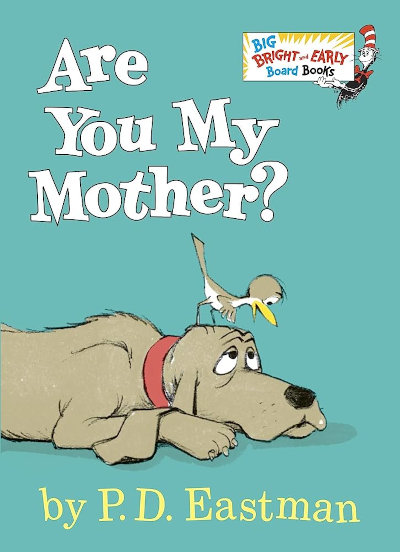 Vampire Weekend's Surprising Jewish Stories
Vampire Weekend's Surprising Jewish Stories


6 min read
Spiritual lessons from the popular children’s book.
Are You My Mother? is a popular children's book. The story is about a baby bird who hatches from his egg while his mother is away. Confused and alone, the baby bird wanders away from the nest, trying to find his mother.
While the author, P. D. Eastman, may have intended to share a simple and charming story, Are You My Mother? holds profound spiritual lessons.

Are You My Mother? can be interpreted as metaphorically describing the human search for meaning, symbolized by a baby bird who wants to find his mother.
The book opens with the heartwarming scene of the mother bird waiting for her egg to hatch. She leaves, momentarily, to get a worm to feed the newly hatched chick, in case it is hungry. The mother was never far from the nest. Nevertheless, the newly hatched chick does not see her.
God prepares for the existence of each human, and yet His Presence is not evident to humans. Similarly, the consciousness of human beings emerges, and we find ourselves in a fully made world. Just as a baby bird knows that it must have a mother, people intuitively know that there must be a Maker, a higher being. They feel compelled to find these answers.
The Talmud teaches that Abraham, the first forefather of the Jewish People, was the first person to recognize God. Adam and Eve spoke to God, but they didn't find Him on their own. They were created knowing Him. Abraham had to find Him on his own.
Ancient sources tell us that Abraham observed the complex and intelligent design of the world. He said, "If I see a house, I look to see who owns and maintains it. How much more so if I see an entire world!" At that moment, God appeared to him and said, "I am the owner of the house!”
Many people embark on this search, but rarely do people find the answers on their own. As seemingly alone in their quest as the newly hatched bird, people don’t know where to look. Compounding the problem, they don't even know what it would look like — if they found it!
Like those who attempt to understand and define God, the newly hatched chick tries to find his mother. They do not realize that their limited abilities will not be sufficient for them to find something which created them.
Not only do they struggle to find meaning, most human beings are unclear about what exactly it is that they are seeking.
Like the baby bird, these human beings continuously overlook their Creator. The baby bird is certain that he would have noticed his mother, if she was there. He rationalizes that he would know if he had made a mistake, and so the baby bird never even attempts to return to the nest. He simply goes on.
Look at how the baby bird processes the responses. For example, at one point, the baby bird asks a kitten, “Are You My Mother?”
What happens?
“The kitten looked and looked, but it did not say a thing. So the baby bird went on.”
Note how the bird realized that a kitten couldn't be its mother, if it didn't say anything. The baby bird - correctly - concluded that his mother would be able to communicate with him. So he continued searching
Then he meets a hen. The hen says “No”. The baby bird accepts this unquestioningly. He can emotionally accept that if something capable of communication denies being his mother, it isn't.
The baby bird doesn't refine his guesses because he lacks a clear understanding of what he seeks. Similarly, people often pursue goals without a precise vision, leading them to wander without gaining clarity, except for recognizing that their current path is not the right one.
In the same way, the baby bird bravely approaches various creatures – the hen, the dog, the cow, even inanimate objects like planes and boats. His efforts are admirable, but for a newborn bird, it's an exhausting ordeal. As he continues his quest, doubt creeps in. He begins to question if he will ever reunite with his mother. The thought of a world without her becomes a haunting possibility, a vision of a world stripped of meaning and purpose. In his own words —
Did he have a mother?
Finally, the baby bird encounters a massive steam shovel, and in his desperation, he poses the same question, “Are You My Mother?” The response he receives is 'Snort,' leaving him in despair. As the steam shovel lifts him, panic sets in, believing that no one can rescue him now. The thought of jumping off is terrifying, promising instant death. In a surprising turn of events, the steam shovel, in a display of unexpected gentleness, returns him to his nest, where, miraculously, his mother has just returned.
Back in his nest, the baby bird finally grasps the truth. With newfound confidence, he declares,
"Yes, I know who you are!
You are not a kitten, a hen, a dog, a cow, a boat, a plane, or even a Snort! You are a bird, and you are my mother."
At last, the baby bird realizes that his mother had been with him all along, an enduring presence that had never wavered. Similarly, God is an enduring presence in our lives. But we sometimes fail to recognize the constant care and love that God provides. Worse, we may mistakenly seek meaning and fulfillment in material or transient sources.
The prophet Jeremiah (Jeremiah 2:27) describes this dynamic, which perfectly mirrors the quest of the baby bird. “They [idolaters] walk up to a tree and say, 'My father!' They pick up a stone and say, 'My mother!’”
Ultimately, it is often the biggest and most intimidating challenges, those from which escape seems impossible, that lead us back to God's embrace.
The tale of the mother bird and her baby serve as a reminder that Divine care and guidance are ever-present, even when we overlook them. Just as the baby bird rediscovered the comforting embrace of his mother's wings, may we also recognize the loving presence of God in our lives.
Reprinted with permission from Isha Yiras Hashem, which is the pseudonym of Tzipora Zuckerman, a wife and mother in Boston, Massachusetts. Subscribe to https://ishayirashashem.substack.com/ to read more warm and humorous articles about Torah, family, and spirituality.

In a similar vein, "The Carrot Seed" by Ruth Krauss teaches a lesson in emunah peshutah (innate belief): The little boy--who wears what appears to be a large yarmulka--plants a seed and cares for it daily, despite the dour predictions of every member of his family (including his father and brother who are both bareheaded) that "it won't come up." And a carrot does come up, "as the little boy had known it would."
When my kids were little and wondered why the boy wore a kipah but his family didn't, we talked on their level about faith and observance.
Thanks, really enjoyed reading!
What an unexpected pleasure finding your writing on aish.com! Beautiful lesson (as always)
What a unique and successful way to teach these concepts. Love it!
WONDERFUL!!!